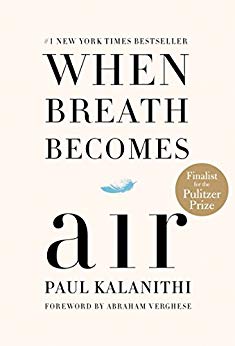

This article is an excerpt from the Shortform summary of "When Breath Becomes Air" by Dr. Paul Kalanithi. Shortform has the world's best summaries of books you should be reading.
Like this article? Sign up for a free trial here .
Do you wonder about the meaning of life, and want to know how to maximize living in the now and find your purpose?
Paul Kalanithi’s book, When Breath Becomes Air, is written in two parts. In this touching memoir, Paul Kalanithi, a doctor, deals with a terminal cancer diagnosis. As a person who was meant to be saving livese, he’s now faced with losing his own. The When Breath Becomes Air themes cover these matters of life and death.
Shortform note: This article and our full When Breath Becomes Air summary is written in a way that allows you to share in the experience provided by the memoir.
Simply reading about the content of the story seems insufficient in expressing the emotional journey. To really provide you with the sensation this book creates, we wrote in the first person, using a voice similar to his. We highly recommend reading the original book for the full experience. Reading the words coming directly from him is a powerful experience we can’t replace.
When Breath Becomes Air, Theme #1: Grief
Shortform note: The When Breath Becomes Air themes focus on life after Paul’s diagnosis, and how he tries to move forward. You can see in the When Breath Becomes Air Part themes that Paul’s values and the way sees himself changes once he realizes he no longer has the future he’s always envisioned.
I’d spent so much of my training learning to account for patients’ identities in my surgical decisions. Yet, in that familiar hospital room, now as a patient, with Lucy next to me, I could feel my identity, that of physician, slipping away. She and I both knew what my scans showed. Cancer lived inside me, had found a number of cozy corners to nestle into. The life I’d been working toward, the role I was going to play in the world, was disappearing.
I’d counseled a number of patients, guided them through the dark so they could see their new futures. But in that instance, I was no longer the guide. I was aimless, lost and unable to find a new path or even see what that new path should look like. My lung cancer diagnosis didn’t sharpen my view on life. It blinded me to life.
Death, which I had turned from a foe into a sometimes necessary associate, no longer waited at my side with deference. Death now sat across from me, and I didn’t know how to address it anymore. I didn’t know how to find the words with which to negotiate. It was as if I was being introduced to death for the first time, and the code of conduct was still unknown.
My meetings with Emma started to surround what my life’s narrative should be. I could follow the path that so many tended to follow—embrace the personal with everything I have left, such as family, friends, and experiences—or I could focus on becoming me again.
As a doctor, the statistics helped me formulate a clear picture for my patients, but for me, the picture was fuzzy. I would have to look death in the eye and determine what was important to me, what gave my life meaning, and find a way to try to live that life in whatever way I could.
When Breath Becomes Air, Theme #2: Life
Shortform note: The When Breath Becomes Air themes are also about regaining a sense of self. Paul’s tries to deal with the fact that he is not the same person he was. This section lets you see how Paul’s life is rapidly changing, and how he and his family try to adjust to the new life they’re facing. The idea of moving forward and rebuilding a life that can still be full of joy are other major When Breath Becomes Air themes.
I was physically diminished, and at first, just lifting my legs was a struggle. My physical therapist asked what I wanted to accomplish with therapy, and I said the ability to bike and run again, two things I’d regularly and readily enjoyed. Losing those abilities compounded my loss of identity. But each day that I made a tiny step in the direction of progress, I was seeing a possible path back to some semblance of the old me.
Still, I didn’t know who I was out in the world. I wasn’t a neurosurgeon. I wasn’t a fit and capable man at the beginning of life. I wasn’t the husband my wife deserved. I had once been someone who could lead and make things happen. Now, I was someone who followed, a recipient rather than agent.
I went in for new scans after six weeks of the Tarceva. My blurry lungs were clear save one tiny spot. My damaged spine appeared to be healing. My cancer was stable. I was grateful and relieved.
Literature became my lifeline. My actions had become framed within the confines of how they related to death. But language had a power to supercede that meaning. The relentless uncertainty about what I should be doing ceased one day when the words of Samuel Beckett overshadowed my fears. I started the day suffering, the pain so bad I couldn’t fathom any possibility for action beyond getting up. I thought, “I can’t go on.” Just as quickly, though, Beckett’s words finished the thought, “I’ll go on.” I faced the day, one step at a time, repeating, “I can’t go on. I’ll go on.”
When Breath Becomes Air, Theme #3: Identity
Shortform note: Unfortunately, in this section of the When Breath Becomes Air, Paul learns that his disease is worsening. It makes it heartbreakingly clear that time is running out for Paul, and shows his difficulty with chemotherapy. In these When Breath Becomes Air themes, Paul works to realign his values, find compassion for himself, and shift the way he views his possible death. You can also see that Paul’s decisions to maintain a meaningful life align with his values.
I went back to work, ensuring I only did one procedure a day. I requested the constant presence of another resident, and the particulars of patient care would fall to them.
The thing about life-altering illness is that the goals or priorities of one day may be different the next. With time seemingly suspended in a finite place, what feels important may suddenly seem otherwise. Death will come, and when it does, it is a singular moment—an isolated moment. But until that day, forming the rest of your life is a journey.
I started to see my journey as traveling through the stages of grief opposite of the theorized direction. What I’d wanted correlated with the different stages. I accepted the reality of death when diagnosed and prepared for it. Then, when it seemed like there was hope, I grew depressed from the plethora of options for how I should face the days in front of me. At some point, something resembling bargaining took place, as I questioned the necessity of needing to go through this illness. Then, that questioning became anger that I had to go through it at all.
My goals and priorities had shifted during each of those moments, but now what I wanted was to ignore what was happening and go back to my life before my diagnosis. I was in denial about the uncertainty of my future, but perhaps that was okay. Perhaps, when you don’t know how much time you have, pretending you have all the time in the world is the appropriate course of action.
Treatment would have to wait until I was in better shape, and experimental trials were out of the question in my condition. The next time I saw Emma, she told me that I likely had another five years ahead of me, but the words rang hollow. She was no longer the poised, assertive guide. She was a hopeful companion in the dark tunnel searching for light.
On my way home from meeting with Emma, Lucy went into labor. My father brought me to the hospital, and on a cot, I lay in the delivery room covered in blankets and heating packs. We waited for two hours for Lucy’s final push. On the Fourth of July, our daughter, Elizabeth Acadia, was born. We called her Cady for short.
I held my swaddled baby and Lucy’s hand at the same time, both of us peering down into the face of life. The finality of my death was still a question, but instead of all the “what ifs,” holding Cady, I now saw a clean slate on which anything was possible.
When Breath Becomes Air, Theme #4: Death with Integrity
Shoftform note: One of the biggest When Breath Becomes Air themes is facing death with the idea that even when dying, you can still find joy and purpose in life. In this section, Paul deals with the fact that his time is running out, and the things that mattered.
Most people either fulfill their hopes or leave them behind. Both states are past; thus, the future becomes the present. My present is all the future I have, but that is not the case for my daughter. I hope to be around for enough time that she will remember me. There are so many things I want to share with her, but writing them down feels presumptuous. I have no inkling of who she will be and what will be important to her.
In this place, where our lives intersect for a brief moment of time, I can only think of one appropriate message to leave her with: when life dictates you gather the evidence of your worth, as it will at various times, remember that by living, you helped me live. It is of no small consequence that you brought a peaceful calm to my dying days, one like I had never known. The joy you gave me is enough, and never doubt that it was everything.
Shortform note: This last section of When Breath Becomes air was written by his wife, Lucy, after Paul’s death. You can see how it aligns with the When Breath Becomes Air themes of acceptance and finding fulfillment.
Paul’s ability to meet death and accept it allowed him to have courage and integrity throughout his illness. Rather than fighting against reality or praying for a Hail Mary, he mourned the life he knew was out of reach and did his best to recreate something else in its place. Even when the illness was breaking his body down, his spirit was never broken. He sought meaning in what was left of his life.
The integrity Paul showed throughout his illness, and especially in those final months, was not limited to his life with cancer. He lived his entire life this way. He faced death daily and sought the answers to how to live despite it.
Shortform note: The full summary of When Breath Becomes Air is available and can help you see and understand these major When Breath Becomes Air themes of making the most out of life, and maintaining a sense of purpose and self in death.

———End of Preview———
Like what you just read? Read the rest of the world's best summary of Dr. Paul Kalanithi's "When Breath Becomes Air" at Shortform .
Here's what you'll find in our full When Breath Becomes Air summary :
- How Paul Kalanithi discovered he had cancer
- How Paul coped with his cancer until his very end
- How Paul's wife dealt with his death and found the strength to continue






